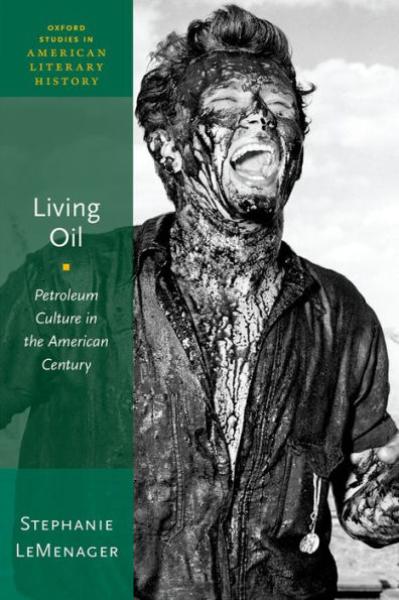Description
Living Oil is a work of environmental cultural studies that engages with a wide spectrum of cultural forms, from museum exhibits and oil industry tours to poetry, documentary film, fiction, still photography, novels, and memoirs. The book's unique focus is the aesthetic, sensory, and emotional legacies of petroleum, from its rise to the preeminent modern fossil fuel during World War I through the current era of so-called Tough Oil. LeMenager explores the uncomfortable, mixed feelings produced by oil's omnipresence in cultural artifacts such as books, films, hamburgers, and Aspirin tablets. The book makes a strong argument for the region as a vital intellectual frame for the study of fossil fuels, because at the regional level we can better recognize the material effects of petroleum on the day-to-day lives of humans and other, non-human lives. The fluid mobility of oil carries the book outside the United States, for instance to Alberta and Nigeria, emphasizing how both international and domestic resource regions have been mined to produce the idealized modern cultures of the so-called American Century.
LeMenager is one of our most incisive and inventive critics, period, and Living Oil is the cutting edge of what literary and cultural criticism is and might be. It's the kind of book to recommend to graduate students, regardless of field, as a model of what's possible in the discipline, or to keep close at hand for inspiration. --Contemporary Literature
[LeMenager] takes an experimental, avowedly essayistic and often intensely personal approach to her subject. This accounts for many of the book's considerable strengths... --Green Letters: Studies in Ecocriticism
Not only does Living Oil take on the super wicked problem of oil with candor, humor, theoretical depth, historical precision, and a rare blend of critical ambition and down-to-earthness, but the book fashions a type of scholarship that is beautifully adapted to the subject: as heteroglossic and bioregionally situated as oil industry self-representations are monoglossic and disembodied; as deeply invested in nimble realism, self-questioning, dialogue, and cultural resilience as post-oil narratives are (frequently) mired in grim certainties and despair. The first 'petrocritical' monograph written from an ecocritical standpoint, Living Oil sets a high bar for future scholars. --The Goose
The book is a leisurely road trip through twentieth-century US media and culture, and LeMenager's goal--'to consider how the story of petroleum has come to play a foundational role in the American imagination and therefore in the future of life on earth'--is accomplished not only through linear argumentation but purposeful meditation. The seepage of fossil fuels into every aspect of our lives suffuses the pages and washes over the reader. --American Quarterly
For LeMenager, the everywhereness of oil presents a problem of materialization, a problem of how to make the everywhere and the ordinary visible. This materialization of oil is necessary, she writes, if we are to lay bare Americans' ultradeep attachment to a resource they know will soon betray them--a relationship LeMenager fascinatingly describes as 'bad love.' LeMenager's remarkable book keeps faith in narrative as a tool for materializing 'the ecologies of modernity' and thus one that can 'contribute to a future that challenges Tough Oil.' -- American Literature
LeMenager is one of our most incisive and inventive critics, period, and Living Oil is the cutting edge of what literary and cultural criticism is and might be. It's the kind of book to recommend to graduate students, regardless of field, as a model of what's possible in the discipline, or to keep close at hand for inspiration. --Contemporary Literature
[LeMenager] takes an experimental, avowedly essayistic and often intensely personal approach to her subject. This accounts for many of the book's considerable strengths... --Green Letters: Studies in Ecocriticism
Not only does Living Oil take on the super wicked problem of oil with candor, humor, theoretical depth, historical precision, and a rare blend of critical ambition and down-to-earthness, but the book fashions a type of scholarship that is beautifully adapted to the subject: as heteroglossic and bioregionally situated as oil industry self-representations are monoglossic and disembodied; as deeply invested in nimble realism, self-questioning, dialogue, and cultural resilience as post-oil narratives are (frequently) mired in grim certainties and despair. The first 'petrocritical' monograph written from an ecocritical standpoint, Living Oil sets a high bar for future scholars. --The Goose
The book is a leisurely road trip through twentieth-century US media and culture, and LeMenager's goal--'to consider how the story of petroleum has come to play a foundational role in the American imagination and therefore in the future of life on earth'--is accomplished not only through linear argumentation but purposeful meditation. The seepage of fossil fuels into every aspect of our lives suffuses the pages and washes over the reader. --American Quarterly
For LeMenager, the everywhereness of oil presents a problem of materialization, a problem of how to make the everywhere and the ordinary visible. This materialization of oil is necessary, she writes, if we are to lay bare Americans' ultradeep attachment to a resource they know will soon betray them--a relationship LeMenager fascinatingly describes as 'bad love.' LeMenager's remarkable book keeps faith in narrative as a tool for materializing 'the ecologies of modernity' and thus one that can 'contribute to a future that challenges Tough Oil.' -- American Literature
Last updated on
Product Details
- Oxford University Press, Brand
- Jan 1, 2016 Pub Date:
- 0190461977 ISBN-10:
- 9780190461973 ISBN-13:
- 280 Pages
- 9.1 in * 6.1 in * 0.7 in Dimensions:
- 1 lb Weight:




